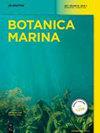台湾北部海域海蟹壳肠分离真菌的多样性
IF 1.4
4区 生物学
Q2 MARINE & FRESHWATER BIOLOGY
引用次数: 0
摘要
除具有经济价值的引起海洋动物疾病的真菌外,与海蟹有关的真菌群落知之甚少。本研究对从海蟹(Portunus sanguinolentus)的甲壳和肠道中培养的真菌进行了多样性研究,并基于rDNA (ITS)内部转录间隔段的核苷酸BLAST搜索结果进行了鉴定。结果表明,从7株血樟(P. sanguinolentus)中共分离出23种256株真菌,其中2种尚未鉴定。大多数菌种属于子囊菌门,而担子菌门中有3种是从肠道中分离出来的。总体而言,热带假丝酵母(45.70 %,发生率)、木灰顶霉(8.98 %)和红霉菌(8.20 %)是蟹的优势真菌。甲壳上的优势真菌依次为C. tropical alis(66.95 %)、Emericellopsis maritima(8.47 %)、A. lignicola和Purpureocillium lilacinum(4.24 %)。肠道菌群以热带镰刀菌(27.54 %)、木霉(16.67 %)、红霉菌(15.22 %)和茄枯萎菌(14.49 %)为主。从真菌多样性指数来看,血羊藿肠道真菌多样性高于甲壳真菌多样性。虽然一些分离的真菌被报道为致病性,但没有报道为螃蟹的病原体,螃蟹样本中没有发现疾病症状。本文章由计算机程序翻译,如有差异,请以英文原文为准。
Diversity of fungi isolated from carapace and gut of the marine crab Portunus sanguinolentus in northern waters of Taiwan
Abstract The fungal community associated with marine crabs is poorly known, except for the fungi causing diseases of marine animals of economic value. In this study we examined the diversity of fungi cultured from carapace and gut of the marine crab Portunus sanguinolentus, and the identification was based on nucleotide BLAST search results of the internal transcribed spacers of rDNA (ITS). A total of 256 fungal isolates representing 23 species were cultured from seven individuals of P. sanguinolentus including two unidentified species. The majority of the species belong to the Ascomycota, while three species of the Basidiomycota were isolated from the gut. Overall, Candida tropicalis (45.70 %, percentage occurrence), Apiotrichum lignicola (8.98 %) and Rhodotorula sp. (8.20 %) were the dominant fungi on the crab. The most dominant fungi on the carapace were C. tropicalis (66.95 %), Emericellopsis maritima (8.47 %), A. lignicola and Purpureocillium lilacinum (both 4.24 %). In the gut, C. tropicalis (27.54 %), A. lignicola (16.67 %), Rhodotorula sp. (15.22 %) and Fusarium solani (14.49 %) were dominant. The fungal diversity in the gut of P. sanguinolentus was higher than on the carapace according to the diversity indices. Although some of the isolated fungi were reported to be pathogenic, none were reported as pathogens of crabs, and no disease symptoms were noticed from the crab samples.
求助全文
通过发布文献求助,成功后即可免费获取论文全文。
去求助
来源期刊

Botanica Marina
生物-海洋与淡水生物学
CiteScore
4.10
自引率
4.50%
发文量
43
期刊介绍:
Botanica Marina publishes high-quality contributions from all of the disciplines of marine botany at all levels of biological organisation from subcellular to ecosystem: chemistry and applications, genomics, physiology and ecology, phylogeny and biogeography. Research involving global or interdisciplinary interest is especially welcome. Applied science papers are appreciated, particularly when they illustrate the application of emerging conceptual issues or promote developing technologies. The journal invites state-of-the art reviews dealing with recent developments in marine botany.
 求助内容:
求助内容: 应助结果提醒方式:
应助结果提醒方式:


